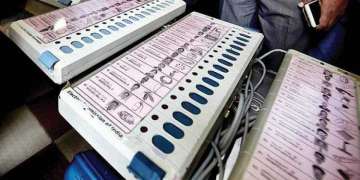In a major development just days before the start of Lok Sabha battle, the opposition parties told the Supreme Court that if election results got delayed due to counting of VVPAT slip of 50 per cent of 13.5 lakh EVMs, it will still help ensure the sanctity of a free and fair contest. The parties on Saturday filed their official response in court in a reply to the Election Commission's (EC) affidavit, which claimed that there is a possibility of delay by an average of six days.
The opposition's response led by Telugu Desam Party (TDP) chief N. Chandrababu Naidu said: "It is a petition filed in public interest by presidents/leaders of 21 different national and regional parties across the country, electorally representing about 70-75 per cent of the people of India."
Apart from Naidu, other petitioners include K.C Venugopal, Arvind Kejriwal, Akhilesh Yadav, Sharad Pawar, Derek O'Brien, Farooq Abdullah, Sharad Yadav, Ajit Singh, Danish Ali and Manoj Jha.
The opposition leaders were not convinced with the study conducted by the Indian Statistical Institute (ISI) for the EC.
The study concluded that 479 randomly selected VVPATs from 13.5 lakh EVMs for paper slip counting had shown accurate results with 99.99 per cent voter confidence level.
The opposition leaders were of the opinion that the study was fundamentally erroneous as it was based on a flawed assumption that parliamentary election being conducted in 543 constituencies all over India and spread over a six-week period was a single homogenous event and said that 479 randomly selected EVMs to verify the entire process was not sufficient.
This sample size considered by the ISI in its study was extremely small to conclude the perfection of the EVMs.
"Petitioners submit that to decide sample size based on population, each Assembly constituency must be considered as a separate unit; the entire country cannot be treated as one single unit," said the petition countering the ISI study.
The opposition leaders instead presented their computation to improve the counting process.
"The petitioners have computed the time likely to be taken in three different scenarios based on ECI's own calculation, if the manpower is increased by just one person" it said.
The delay of an average of six days will occur, if the EC does not increase the manpower.
If the EC doubles manpower, the counting of VVPAT paper slips of 50 per cent EVMs would be reduced to a little over two-and-a-half days (2.6 days). For 33 per cent of EVMs, the results would be delayed by over one-a-half day (1.8); and if VVPAT slips of 25 per cent of EVMs were counted, the resulting delay would be merely under one-and-a-half day (1.3).
The petition said that currently, as per the existing EC guideline, the vote-count on an EVM selected randomly per Assembly constituency was matched with VVPAT slip count. The petitioners have rejected this random selection criterion of the EC.
The petitioners told the apex court: "Even a delay of six days in declaring results of general election is not a serious delay if it ensures integrity of the electoral process. If a delay of six days is to be balanced with electoral process, the balance will certainly tilt towards integrity of the electoral process.
"We are not casting any aspersion on the EC... We only want a free and fair election process."
